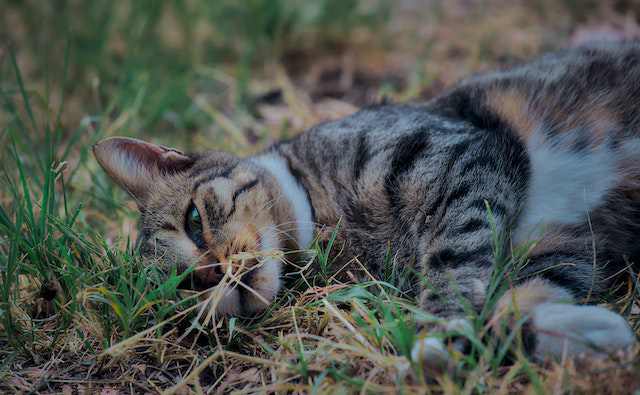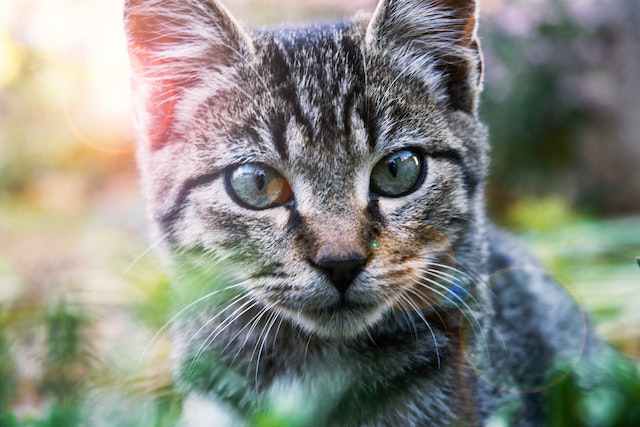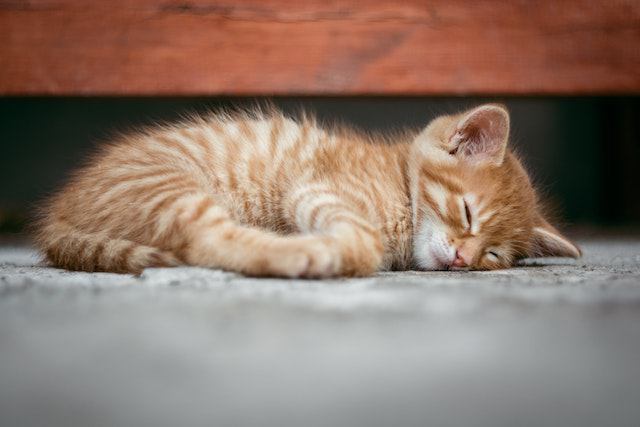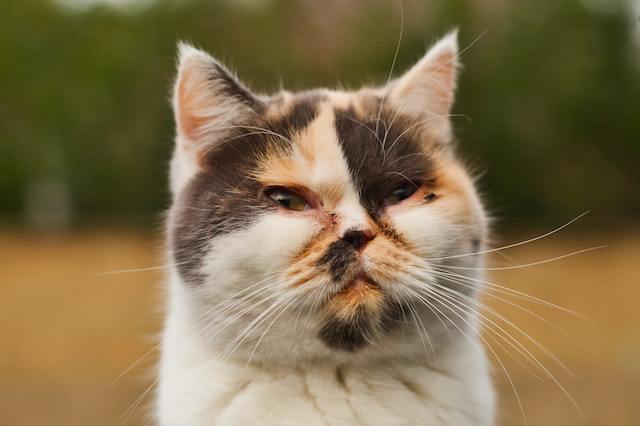9 Potential Causes of Kitten Sneezing Blood With Tips

Have you ever experienced the alarming sight of your adorable little kitten sneezing blood?
Don’t panic just yet – this blog post is here to shed some light on this concerning issue and guide you through the possible causes and solutions.
Let’s get started…
Why is my kitten sneezing blood?
Your kitten may be sneezing blood due to several possible causes, including respiratory infections, nasal trauma, or nasal tumors.
It is important to have your kitten examined by a veterinarian to determine the underlying cause and provide appropriate treatment.
Common Causes of Kitten Sneezing Blood

The following are some common causes of kitten sneezing blood with tips:
1. Upper Respiratory Infections (URIs)
Upper Respiratory Infections (URIs) are one of the most common causes of a kitten sneezing blood.
This occurs when the delicate blood vessels in the nasal passages become inflamed and rupture due to the infection.
The main causes of URIs in kittens are typically viral or bacterial pathogens, such as feline herpesvirus or calicivirus.
To prevent URIs, it is important to maintain good hygiene, provide a stress-free environment, and ensure proper nutrition for the kitten.
Treatment for URIs usually involves supportive care, such as keeping the nasal passages clear, providing adequate hydration, and administering antibiotics or antiviral medications if necessary.
2. Nasal Trauma or Injury
Nasal trauma or injury can be a common cause of a kitten sneezing blood. This occurs when the delicate blood vessels in the nasal passages are damaged, leading to bleeding.
Causes of nasal trauma in kittens can include accidents, falls, or rough play. Prevention involves ensuring a safe environment for the kitten and minimizing the risk of accidents.
Treatment may include cleaning the nasal passages, applying pressure to stop bleeding and seeking veterinary care if the bleeding persists or if other symptoms are present.
3. Polyps or Tumors
Polyps or tumors can be a common cause of a kitten sneezing blood. These abnormal growths can develop in the nasal passages, causing irritation and inflammation.
The blood vessels within the growths may rupture, leading to blood in the sneezes. The causes of polyps or tumors in kittens can vary, including genetic factors or exposure to certain viruses.
Prevention involves maintaining a clean and hygienic environment, limiting exposure to potential carcinogens, and ensuring proper vaccination.
Treatment options may include surgical removal of the growths, radiation therapy, or medication to manage symptoms and reduce inflammation. Consulting a veterinarian is crucial for an accurate diagnosis and appropriate treatment plan.
4. Irritants or Inhaled Toxins
Kittens may sneeze blood due to irritants or inhaled toxins that cause irritation and damage to their nasal passages.
This can occur when kittens are exposed to dusty environments, strong chemicals, or certain allergens.
Prevention involves keeping the kitten’s environment clean, free from potential irritants, and ensuring good ventilation.
Treatment may include removing the kitten from the source of the irritant, providing supportive care, and addressing any underlying respiratory infections. Veterinary consultation is crucial for an accurate diagnosis and appropriate treatment plan.
5. Fungal infections
Fungal infections, such as Cryptococcus, can cause a kitten to sneeze blood. This occurs when the fungus enters the respiratory system and causes inflammation and damage to the blood vessels in the nasal passages.
The infection can be transmitted through inhalation of fungal spores found in soil, bird droppings, or other contaminated environments.
To prevent these infections, it is important to keep kittens in clean and hygienic environments, avoiding exposure to contaminated areas.
Treatment typically involves antifungal medications prescribed by a veterinarian, along with supportive care to manage symptoms and boost the kitten’s immune system. Early detection and prompt treatment are crucial for a successful outcome.
6. Tooth Pathology
Tooth pathology can be a common cause of a kitten sneezing blood. This occurs when there is an infection or inflammation in the kitten’s mouth, leading to bleeding from the gums or nose.
The most common causes of tooth pathology in kittens are dental infections, periodontal disease, or tooth fractures.
Prevention can be achieved by regular dental care, including brushing the kitten’s teeth and providing appropriate chew toys.
Treatment usually involves a veterinary examination to diagnose the specific tooth pathology and may include dental cleaning, extractions, or antibiotics to address the underlying infection.
7. Foreign Object in Nose
Foreign objects in the nose can be a common cause of a kitten sneezing blood. This occurs when small objects, such as grass, dirt, or even small toys, get lodged in the nasal passages.
The causes of foreign objects in the nose can vary, but often kittens are curious and may sniff or play with objects that can easily become stuck.
Prevention involves keeping small objects out of a kitten’s reach and creating a safe environment.
Treatment may require the assistance of a veterinarian, who can carefully remove the foreign object using specialized tools or techniques, ensuring the kitten’s safety and well-being.
8. Blood Clotting Disorders
Blood clotting disorders can be a rare but serious cause of kittens sneezing blood. These disorders can occur due to genetic abnormalities or certain underlying health conditions.
When a kitten has a blood clotting disorder, even minor injuries or irritation in the nasal passages can trigger bleeding.
Prevention involves regular veterinary check-ups to identify any underlying health conditions and genetic testing to assess the risk of blood clotting disorders.
Treatment may include medications to manage the underlying disorder, blood transfusions, or surgical intervention in severe cases. Immediate veterinary attention is crucial to ensure the well-being of the kitten and prevent further complications.
9. Irritation or Allergic Reaction
Irritation or allergic reactions can be a common cause of a kitten sneezing blood. This occurs when the kitten’s nasal passages become inflamed or irritated, leading to small blood vessels breaking and resulting in blood in the sneeze.
Potential causes of this irritation or allergic reaction include environmental allergens, such as pollen, dust mites, or mold spores, as well as certain irritants like cigarette smoke or strong cleaning chemicals.
Prevention involves minimizing cat exposure to potential allergens or irritants, keeping the kitten’s environment clean, and using air purifiers if necessary.
Treatment may include antihistamines or corticosteroids prescribed by a veterinarian to reduce inflammation and control the allergic reaction.
Learn more about health problems in cats.
When to Seek Veterinary Help for Your Kitten Sneezing Blood

When your kitten is sneezing blood, it is important to seek veterinary help promptly. This could be a sign of a serious underlying condition that requires medical attention.
Blood in the sneezes may indicate an injury, infection, or a more severe respiratory problem. A veterinarian will be able to assess your kitten’s symptoms and provide the necessary treatment to address the issue.
Delaying veterinary care could lead to further complications or worsening of your kitten’s condition. It is always better to err on the side of caution and seek professional help when your kitten is experiencing unusual symptoms like sneezing blood.
Diagnosis of Kitten Sneezing Blood
Kitten sneezing blood can be a cause for concern and requires immediate veterinary attention.
The diagnosis of this condition typically involves a thorough physical examination of the kitten, including checking their respiratory system and nasal passages.
Diagnostic tests like blood work, nasal swabs, and imaging may be conducted to rule out underlying infections, respiratory diseases, or trauma.
Regular follow-up visits with the veterinarian are essential to monitor the kitten’s progress and ensure a successful recovery.
Treatment Options for Kitten Sneezing Blood

When a kitten is sneezing blood, it can be a concerning symptom that may indicate an underlying health issue. It is important to contact a veterinarian for a proper diagnosis and treatment plan.
Here are some potential treatment options that may be considered:
1. Antibiotics and antiviral medications: If the kitten is diagnosed with an upper respiratory infection (URI), the veterinarian may prescribe antibiotics to treat any bacterial infections and antiviral medications to address viral infections.
2. Steroids: In some cases, steroids may be prescribed to reduce inflammation and relieve symptoms associated with respiratory conditions. However, steroids should only be used under the guidance of a veterinarian, as they can have potential side effects.
3. Eye and nose drops: Eye and nose drops may be recommended to help alleviate symptoms and provide relief from irritation caused by sneezing and discharge.
4. Supportive care: Providing supportive care is crucial in helping the kitten recover. This may include ensuring the kitten has a clean and comfortable environment, maintaining proper hydration, and providing a nutritious diet.
5. Nasal flushes or nebulization: In certain cases, nasal flushes or nebulization therapy may be used to help clear the nasal passages and reduce congestion.
It is important to note that the specific treatment plan will depend on the underlying cause of the kitten’s symptoms.
Therefore, it is essential to consult with a veterinarian who can properly diagnose the condition and recommend appropriate treatment options.
Related Questions
Should I be concerned if my kitten sneezes blood occasionally?
While occasional sneezing blood can be normal due to minor nasal irritation or a small injury, it is still advisable to have your kitten checked by a vet. It’s better to be safe and rule out any potential underlying issues, especially if the frequency or severity of the sneezing episodes increases.
Are there any home remedies I can try for my kitten’s sneezing blood?
When it comes to kittens sneezing blood, it’s best not to attempt any home remedies without consulting a veterinarian first. Sneezing blood can be a sign of a more serious condition, and only a professional can properly diagnose and treat it. Administering inappropriate remedies could potentially worsen the situation.
Can allergies cause a kitten to sneeze blood?
Yes, allergies can sometimes cause a kitten to sneeze blood. Allergic reactions can lead to nasal inflammation and irritation, which may result in blood-tinged sneezing. If you suspect allergies, it’s crucial to consult with a vet to identify the triggers and develop an appropriate management plan.
What tests might the vet perform to determine the cause of my kitten’s sneezing blood?
To diagnose the cause of your kitten’s sneezing blood, the vet may perform a thorough physical examination, including a close inspection of the nasal passages. They may also recommend further tests, such as blood work, nasal swabs, X-rays, or even a biopsy if necessary, to help identify any underlying conditions.
Can sneezing blood be a sign of a serious health condition in kittens?
Yes, sneezing blood can indicate a serious health condition in kittens. It could be a symptom of infections like feline herpesvirus or calicivirus, which require prompt treatment. Additionally, it could indicate more severe issues like nasal tumors or bleeding disorders. Early veterinary intervention is crucial to ensure the best outcome for your kitten’s health.
Conclusion
In conclusion, if you’ve noticed your adorable little kitten sneezing blood, it’s vital not to ignore this alarming sign.
While it may be a symptom of something as simple as a minor infection, it could also indicate a more serious underlying health issue.
Remember, your furry friend’s well-being should always be a top priority, so don’t hesitate to consult a veterinarian for a proper diagnosis and treatment. Keep those kitty noses clean and happy!
